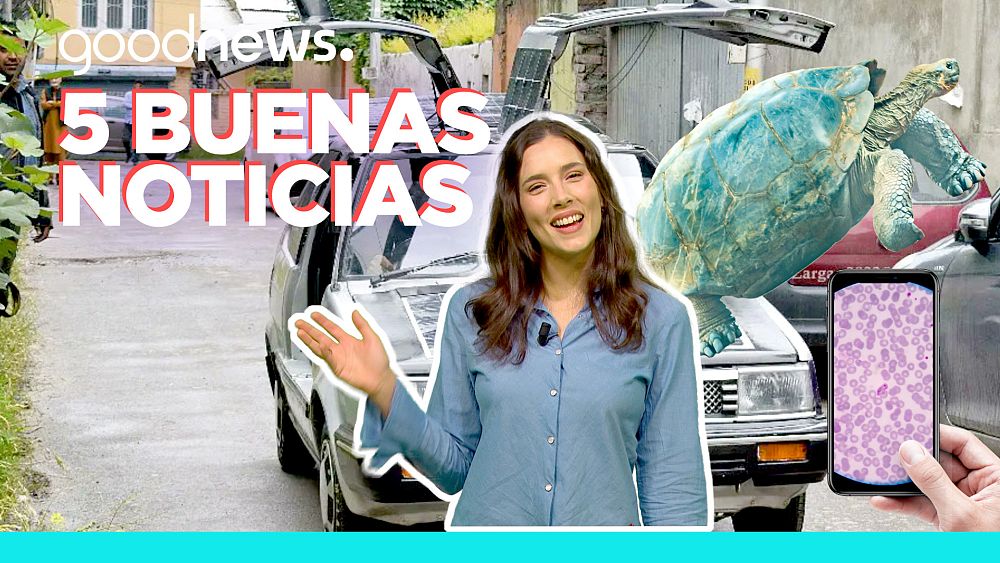Another week, another five news to rejoice and start the week on the right foot. If you like them and find value in them, share them with your friends.
-
A math teacher in India has single-handedly built a solar-powered car.
-
Giant tortoises could give us clues on how to smooth the aging process.
-
A binational park will be built between the border of Mexico and the United States.
-
Malaria is the leading cause of death in Africa, but its days may be numbered, scientists say.
-
A Georgian hero dog renders a useful service to children in nurseries.
Watch the video above to learn more about each story (we recommend it), or continue reading below…
1. A math teacher in India has single-handedly built a solar-powered car.
While the first production-ready solar car hit the headlines with a staggering €250,000 price tag, a math teacher from India’s Kashmir Valley has just built his own.
Bilal Ahmed, father of two children, has made his creation viral, which has taken him 11 years to make.
His goal was to build a “luxury” and sustainable vehicle that was not just for the wealthy. He did it without any outside funding, spending just over €18,000 to build the fully automatic vehicle.
“If he had gotten the support he needed, he might have been the Elon Musk of Kashmir,” he told a group of reporters.
Almost every surface of the car is covered in solar panels and, like the DeLorean time machine in Back to the Future, it has flap-type doors that open skyward to catch as many rays as possible. In addition, the panels are efficient on days of low sunlight.
Mr. Ahmed has received support from the innovation center of the National Institute of Technology in Srinagar and hopes to set up a company for mass production of the vehicles, which would also provide a great job opportunity for the youth of the region.
2. Giant tortoises could give us clues on how to slow down the aging process.
No matter how many fruits or vegetables we eat or how many hours of yoga we practice, our bodies weaken as we age.
However, species like the giant Galapagos tortoises –of which, by the way, a few weeks ago one of them was resurrected from extinction– seem not to suffer the ravages of aging.
Scientists believe that we can learn a lot from them.
Two groups of researchers launched an investigation into age-related decline in 52 species of captive tortoises.
The team used decades of tracking data to look at factors such as metabolism, and found that 75% of species exhibited “negligible senescence” – little sign of the process in which the cell ages. And some species, like Greek tortoises, even showed negative rates of senescence, meaning their risk of mortality decreased as they aged.
“For them, this deterioration with age does not occur. They continue to repair their cells and tissues throughout life,” explains Rita da Silva, head of the research at the University of Southern Denmark.
“This means that as they age, they probably become more efficient at putting their energy into the functions that make them survive longer.”
“So if we start to understand what makes tortoises and freshwater turtles escape senescence and reduce their aging rates, perhaps in the future we’ll learn a lot more about human aging as well,” says the biologist.
3. A binational park will be built between the border of Mexico and the United States.
A binational park will be built between the border of Mexico and the United States, connecting the cities of Laredo in Texas (USA) and Nuevo Laredo in Tamaulipas (Mexico), becoming a prototype for border cities
The park is an initiative promoted by the two countries, and wants to celebrate the unique relationship between the two cities and the river they share, helping to restore and revitalize the river’s ecosystem and attract tourists.
“The park envisions creating a place where people from both nations can meet and meet with family and friends, have weddings, quinceañeras, market fairs and really make the space an active part of their lives like it used to be,” he explains. to Euronews Richard Archer, Principal Architect, Binational Park Project.
Specifically, they want the citizens of both nations to be able to access the green space without the need for documentation.
“The idea is to create a community, but that does not prevent security from being reinforced, both things go hand in hand (…) You can have a very united border while still being secure,” says Barbara Warren, manager of the project. of the Binational Park.
The designers say they see the park as a “hug” between the two cities.
“It’s a symbol, it’s the hug, it’s a way of saying to the world: We care about each other. We want to show that there is a different way of living on a border,” says Archer, the principal architect.
4. Malaria is the leading cause of death in Africa, but its days may be numbered, scientists say.
In Africa, malaria is a much bigger threat than COVID-19. It is the leading cause of death for children under five in the entire continent.
But trials of a new vaccine suggest that the end of these intolerable numbers is near.
The new R21 vaccine is the first to exceed the WHO efficacy target of 75%.
In a 2019 trial in Burkina Faso it demonstrated a high-level efficacy of 77%, results that are expected to be repeated at the end of a larger trial in four African countries.
India’s Serum Institute, the world’s largest vaccine maker, says it is poised to supply at least 200 million doses a year, just the scale needed to defeat malaria.
Adrian Hill, director of the Jenner Institute at the University of Oxford – where AstraZeneca’s COVID-19 vaccine was born – believes the R21 vaccine could substantially reduce deaths from next year, and by as much as 75% by 2030.
5. A Georgian hero dog renders a useful service to children in nurseries.
A stray dog named Kupata (meaning “sausage”), has become a local celebrity for his volunteer services in helping daycare children cross the street safely.
The dog was awarded the “People’s Choice” award in Batumi, Georgia, after being filmed jogging with a group of children and barking at cars as they approached a crosswalk.
If you find value in this roundup and want to hear more good news, let us know what you think in the comments and share our stories with your friends.
–


